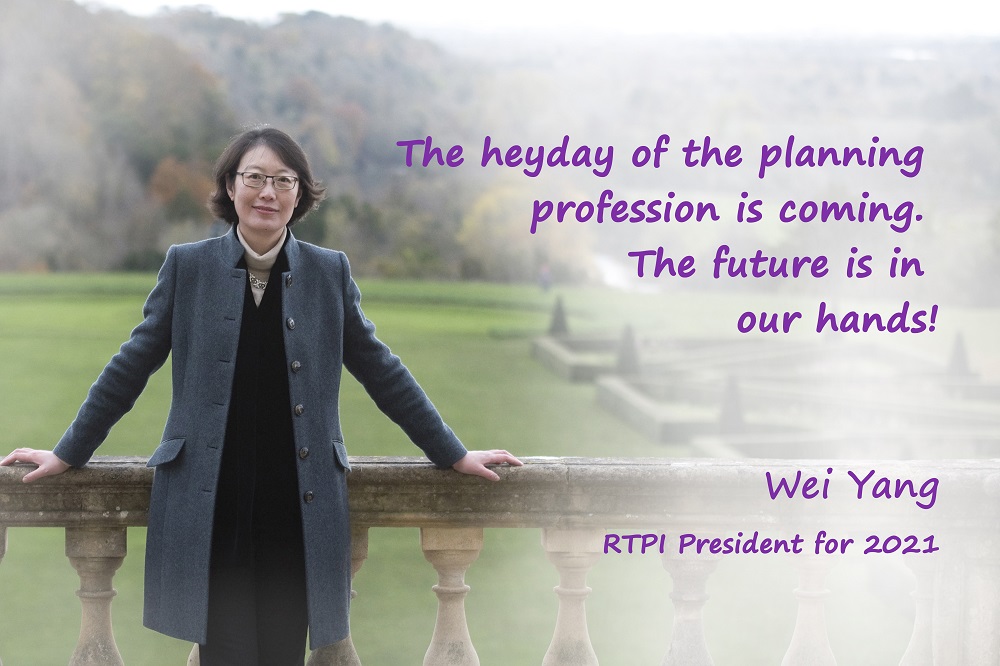
By RTPI President Dr Wei Yang FRTPI FAcSS MCIHT
This is my last RTPI president’s blog. There are so many things that I want to reflect and so many people I want to say
‘Thank You’ to after this very special year. But the space is limited, just like the time and capacity constrains we all have. So, I decided to use this precious opportunity to talk about the future for planning – a digital future for planning.
Reimagining spatial planning as an applied science
It is vital that we recognise spatial planning as an important applied science discipline, which interconnects social, environmental, and behavioural science. Together with the pandemic, the climate and biodiversity crises are the most direct threats to the survival of humanity. Our future prosperity, our health and well-being aspirations are dependent on whether those urgent crises can be tackled. Spatial planning is a pivotal discipline to deliver a place-based systems approach to achieve zero carbon, to formulate a harmony with nature, to create healthy and beautiful places, and to bring the best out of people in contributing to a circular economy and an inclusive society.
In summer 2021, the Prime Minister set out plans to realise and maximise the opportunities of scientific and technological breakthroughs to ensure the UK’s world-leading science and ideas transform into solutions for public good. The National Science and Technology Council, formed and chaired by the Prime Minister, has a remit is “to provide strategic direction on the use of science and technology as the tools to tackle great societal challenges, level up across the country and boost prosperity around the world” – a set of targets identical to what spatial planning needs to achieve.
The government is currently investing £14.9 billion in R&D in 2021-22. In the 2021 Chancellor's Autumn Budget, science and innovation have been given a central role with a commitment to significantly increasing funding to £20 billion by 2024/25.
Spatial planning empowered by digital revolution
The greatest innovation needed in spatial planning is a whole change in approach enabled by digital technologies and big data. In the last two decades, advances in data and digital technology have become deeply embedded within our daily lives. E-commerce giants have transformed the commercial regime. Their success comes from creating revolutionary data-driven supply-chain systems with the ability to provide customer-adaptive products. However, the digital revolution seems to have by-passed spatial planning. Digital integration has been slow and has happened in a piece-meal manner. In mainstream planning practice, there is little cross-disciplinary breakthrough and bigdata has not benefitted the understanding of community needs and how our cities, towns and villages need to function as much as it could.
The digital revolution in planning needs to start from how we work with each other, how we share our data and knowledge, and how we communicate with citizens. The digital revolution in planning needs to be led by planners, as digital technology can enable planners do things which they do not have capacity to do before, but the planner’s role can never be replaced with automated procedures for resolving problems of the kind that planners face.
Developing digital skills and capacities
Last year, as the RTPI President, I chaired three RTPI General Assembly debates on the future of the planning profession. I asked RTPI General Assembly members to identify the profession’s key transferable skills – a set of comprehensive skills including visioning, analytical skills, problem solving skills, engagement, negotiation & presentation skills, spatial skills, and management skills were identified. The soft skills and empathy (unique to human beings) are fundamental qualities of the profession’s skillsets. Planners do not need to be expert at everything but being digitally enabled would allow them to link their unique place-based skillset with other professions’ expertise to facilitate democratic and evidence-based decision-making process.
The RTPI General Assembly members also identified leadership skills, digital and data analytic skills, multidisciplinary skills, public/private cooperation and social media skills as key future skills which planners should have. It is consistent with a broad analysis in the industry – The State of the Profession Report 2020 identified that data analysis is the fastest rising core skills shared amongst sustainability professionals, with statistically significant year-on-year growth of 18%. There is an urgent need for the planning profession to develop adequate digital skills and capacities, to ensure it is future proofed to cultivate interdisciplinary leaders and enablers, and to continually attract future talents.
In February 2021, I had the privilege of setting up an independent Digital Task Force for Planning with Professor Michael Batty aiming to raise awareness about the expertise and skills needed to empower the planning profession in the digital era. Through the work of the Digital Task Force, we spoke with more than 400 planners and stakeholders and run extensive consultations. Professor Batty and I organised over 100 virtual meetings and workshops. I was touched by the overwhelming support from our members and other stakeholders. Our report, A Digital Future for Planning – Spatial Planning Reimagined will be launched in early February. I hope it can help to unlock the full potential of planning profession in the digital era and help to develop a digitally enabled new approach to spatial planning.
This decade, the 2020’s, is a crucial time for the future survival of humanity. The UN Environment Programme has recognised planning as a popular profession for young people seeking ‘green jobs’. The Planning profession, together with Architecture, has been regarded as the second of the top 10 occupations for sustainability. The planning profession must take its professional responsibility seriously and be proactive to modernise itself. The world deserves a reimagined planning profession in the digital era.
Finally, I want to express my great gratitude to everyone supported me during my presidential year. I will say proper ‘thank you’ in my valedictory speech tomorrow. I also wish our 2022 President Timothy Crawshaw will have a fruitful year.
I have no doubt the heyday of the planning profession is coming.


